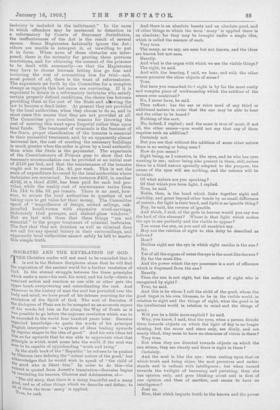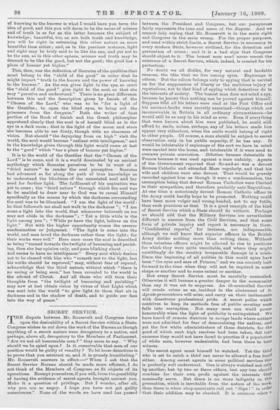SOCRATES AND THE REVELATION OF GOD.
THE Christian reader will not need to be reminded that it is not in the Hebrew Scriptures alone that he will find the aspiration of the ancient world for a further revelation of God. In the eternal struggle between the three principles Which make a man—his soul, his mind, and his body—there is Constant action and reaction as one side or other gets the upper hand, overpowering and subordinating the rest And Wherever in the history of man the soul has prevailed over the body and mind, we have proof of his intense yearning for the l'evelation of the Spirit of God. The soul of Socrates, if the dialogues of Plato are to be accepted as an accurate report Of Lis words, led him as far along the Way of Truth as it as possible to go before the supreme revelation which was to be accorded to the world four hundred years later. Socrates 1,.egarded knowledge—to quote the words of his principal 4nglish interpreter—as "a system of ideas leading upwards 1)3' regular stages to the idea of good." And his own ideas led ltun so far upwards that he was able to appreciate what that Principle is which must come into the world, if the soul was ever to be capable of apprehending "truth and being." In the sixth book of the " Republic " Lie refuses to be pushed 'Y Glaucon into defining the "actual nature of tl:e good," but ateknowledges that he would wish to speak of "the child of O e good who is likest him." In order to do this—the Zztraet is quoted from Jowett's translation—Socrates begins 11 reminding his hearers, Glaucon and Adeimantus, of 4' The old story, that there is a. many beautiful and a many and so of other things which we describe and define; to of them the term ' many' is applied.
True, he said.
And there is an absolute beauty and an absolute good, and of other things to which the term ' many ' is applied there is an absolute; for they may be brought under a single idea, which is called the essence of each.
Very true.
The many, as we say, are seen but not known, and the ideas are known but not seen.
Exactly.
And what is the organ with which we see the visible things P The sight, be said.
And with the hearing, I said, we hear, and with the other senses perceive the other objects of sense P
True.
But have you remarked thr t sight is by far the most costly and complex piece of workmanship which the artificer of the senses over contrived P No, I never have, he said.
Then reflect: has the ear or voice need of any third or additional nature in order that the one may be able to bear and the other to be heard P Nothing of the sort.
No, indeed, I replied ; and the same is true of most, if not all, the other senses—you would not say that any of them requires such an addition?
Certainly not.
But you see that without the addition of some other nature there is no Boeing or being seen P How do you mean P
Sight being, as I conceive, in the eyes, and he who has eyes wanting to see; colour being also present in them, still, unless there be a. third nature specially adapted to the purpose, the owner of the eyes will see nothing, and the colours will be invisible.
Of, what nature are you speaking ?
Of that which you term light, I replied.
True, he said.
Noble, then, is the bond which links together sight and visibility, and great beyond other bonds by no small difference of nature ; for light is their bond, and light is no ignoble thing P Nay, he said, the reverse of ignoble.
And which, I said, of the gods in heaven would you say was the lord of this element P Whose is that light which makes the eye to see perfectly and the visible to appear P You mean the sun, as you and all mankind say.
May not the relation of sight to this deity be described as follows P How P Neither sight nor the eye in which sight resides is the sun ? No.
Yet of all the organs of sense the eye is the most like the sun ? By far the most like.
And the power which the eye possesses is a sort of effluence which is dispensed from the sun P Exactly.
Then the sun is not sight, but the author of sight who is recognised by sight P True, he said.
And this is he whom I call the child of the good, whom the good begat in his own likeness, to be in the visible world, in relation to sight and the things of sight, what the good is in the intellectual world in relation to mind and the things of mind : Will you be a little more explicit P he said.
Why, you know, I said, that the eyes, when a person directs them towards objects on which the light of day is no longer shining, but the moon and stars only, see dimly, and are nearly blind, they seem to have no clearness of vision in them?
Very true.
But when they are directed towards objects on which the sun shines, they see clearly and there is sight in them P Certainly.
And the soul is like the eye: when resting upon that on which truth and being shine, the soul perceives and under- stands and is radiant with intelligence ; but when turned towards the twilight of becoming and perishing, then she has opinion only, and goes blinking about and is first of one opinion and then of another, and seems to have no intelligence P Just so.
Now, that which imparts truth to the known and the power
of knowing to the knower is what I would have you term the idea of good, and this you will deem to be the Cause of science and of truth in so far as the latter becomes the subject of knowledge; beautiful, too, as are both truth and knowledge, you will be right in esteeming this other nature as more beautiful than either; and, as in the previous instance, light and sight may be truly said to be like the sun, and yet not to be the sun, so in this other sphere, science and truth may be deemed to be like the good, but not the good; the good has a place of honour yet higher."
This, then, was the definition of Socrates of the qualities that must belong to the "child of the good" in order that he might impart "truth to the known and the power of knowing to the knower." As the sun gives light to the eye, so must the "child of the good" give light to the soul, so that she may "perceive and understand." There is no great difference between this and the description given by Isaiah of the 4.1 Chosen of the Lord," who was to be "for a light of the Gentiles; to open the blind eyes, to bring out the prisoners from the dungeon." Both the writer of that portion of the Book of Isaiah and the Greek philosopher apprehend clearly that the soul ik of herself blind as is the eye in a dark room ; that in the light of the moon and stars she becomes able to see dimly, though with no clearness of vision. But should'" the dayspring from on high" visit the world, the soul would become "radiant with intelligence," and in the knowledge given through this light would come at last to the "good" which "has a place of honour yet higher."
It is to the world of the Gentiles that the "Chosen of the Lord" is to come, and it is a world dominated by an ancient mythology which Socrates perceives to be in want of a "third nature" to ' render the soul perceptive. Socrates bad advanced so far along the path of true knowledge us to understand the blindness of the unassisted soul and her need for further light. The fulfilment of his aspiration Was yet to come; the "third nature" through which the soul was to be enabled to draw near to God was to reveal Himself specifically as the means by which the darkness surrounding the soul was to be illumined. "I am the light of the world : he that followeth me shall not walk in the darkness " ; "I am come a light into the world, that whosoever believeth on me may not abide in the darkness"; "Yet a little while is the light among you "; "While ye have the light, believe on the light." But with the higher opportunity comes the severer condemnation or judgment. "The light is come into the world, and men loved the darkness rather than the light ; for their works were evil." Here once more the soul is described as being "turned towards the twilight of 'becoming and perish- ing, then she has opinion only, and goes blinking about and seems to have no intelligence."' Every soul which desires not to be classed with him who " cometh not to the light, lest his works should be reproved," may, without fear of reproof, acknowledge that the third nature, without which "there is no seeing or being seen," has been revealed to the world in the advent of Christ. And all those who will turn their thoughts from "the twilight of becoming and perishing" may now at last obtain vision by virtue of that Light which was sent into the world "to give light to them that sit in darkness and in the shadow of death, and to guide our feet into the way of peace."





































 Previous page
Previous page